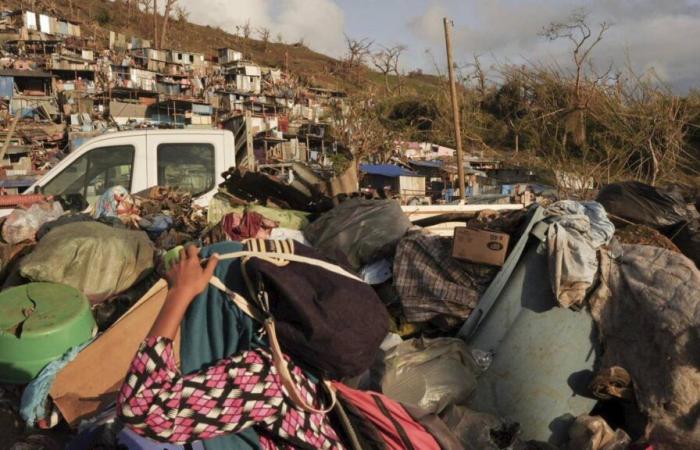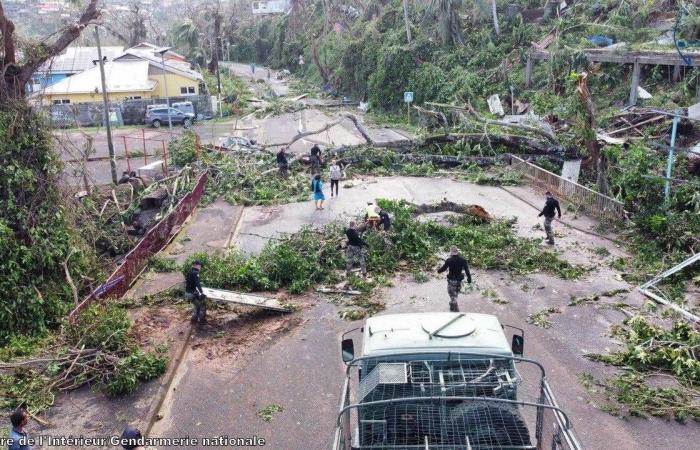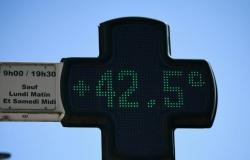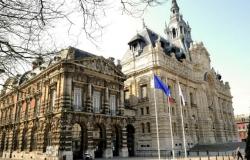With an initial duration of one month, the system can be renewed for periods of two months, and “allows greater responsiveness to local and national authorities, while reducing certain administrative procedures”, indicated the ministry in a press release.
Macron at Mayotte’s bedside on Thursday
Cyclone Chido, the most intense that Mayotte has experienced in 90 years with winds of more than 220 km/h, hit the archipelago on December 14. According to a provisional report from the Ministry of the Interior, it left 31 dead and 1,373 injured, even if the authorities anticipate a much higher number of victims.
On the archipelago with its disfigured landscape, the inhabitants of the precarious neighborhoods of the capital Mamoudzou try with the means at hand to patch up what can be, by hammering the sheet metal or putting makeshift roofs on their homes blown away by the wind.
Further away, bulldozers are working to restore the heliport of the Mayotte hospital center (CHM), which was hard hit but which continues to operate. “Little by little, we are reintegrating services as we manage to clean them,” explains the director of the CHM, Jean-Mathieu Defour, to AFP.
Thursday, Emmanuel Macron will go to the bedside of patients but also caregivers of the CHM, before going to a “destroyed neighborhood”, announced the Elysée. The Head of State is taking rescue workers as well as four tonnes of food and health cargo on his plane. “The tragedy of Mayotte is probably the most serious natural disaster in the history of France for several centuries,” wrote Prime Minister François Bayrou in a letter addressed to political forces on Wednesday.
Education and hospital systems affected
“We are moving on to the massive phase of support for Mayotte,” also declared Patrice Latron, the prefect of Reunion, the island from where the authorities have launched a “civil maritime bridge” which will start overnight with the departure of some 200 containers expected on Sunday on the archipelago. Among this load, the equivalent of “millions of liters of water”. Thanks to these shipments, “no shortage of bottled water is expected,” the authorities welcomed. More than 100 tonnes of food were to be distributed on Wednesday, according to the resigning Minister of the Interior Bruno Retailleau.
The water supply “works at 50%” François-Noël Buffet said on Wednesday, but it presents a risk of “poor quality”. The electricity is only “partially restarted”. The roads are mostly cleared.
The education system is also very affected: the 221 schools, 22 middle schools and eleven high schools in the archipelago “are all impacted. 40% of the school buildings are damaged and therefore cannot be used for the moment,” the Ministry of National Education said. Some 27 establishments also accommodate 9,000 victims. “The ministry is actively working to prepare for the start of the school year from January 13,” adds the ministry, recalling that 117,000 students are normally educated in Mayotte.
In Mayotte, a field hospital with around a hundred medical beds will be set up in the coming days, announced François-Noël Buffet, resigning Minister of Overseas Territories.
Paris’s intention to legislate against illegal immigration
In addition to relief, establishing a human toll is one of the authorities’ priorities. So far, 22 deaths have been recorded at the hospital and nine by the municipalities. But the official count, recognized the Ministry of the Interior, “does not correspond to the reality of the 100,000 people who live in precarious housing”, occupied largely by immigrants from neighboring Comoros.
A research mission was set up to carry out this count, made all the more delicate as the Comoros, where some of the inhabitants of Mayotte come from, is a land of strong Muslim tradition: according to the rites of Islam, the deceased must be buried as quickly as possible.
In the now bare slums, “it’s buried like crazy, so we’ll never have a count,” told AFP a member of the judicial staff at the Mamoudzou court who requested anonymity. “Whether they are people in a regular or irregular situation, it doesn’t matter, we will never know.”
Interior Minister Bruno Retailleau reiterated on Wednesday his intention to legislate against “totally uncontrolled” illegal immigration on the archipelago and to be “much tougher with the Comoros”.







